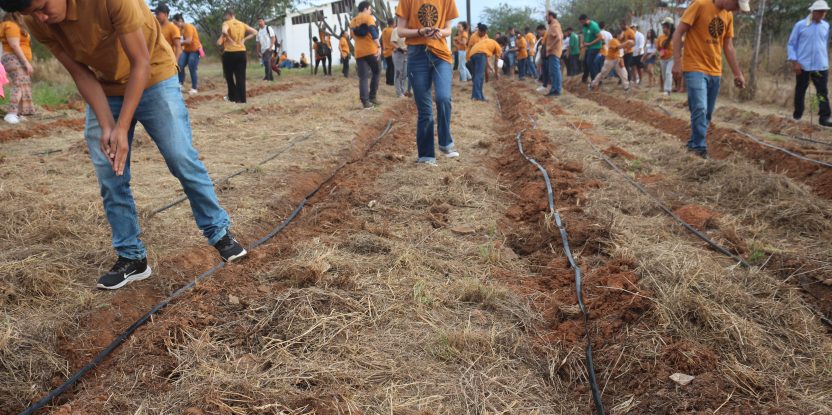
In July, over 150 women and men from across Brazil came together for the third annual meeting of the Redário. What did they share? Knowledge and, in their hands, the most important thing: seeds. The event was driven by a collective desire to exchange experiences and foster learning.
The Redário serves as a hub for networks and groups of native seed collectors, working to strengthen the foundation of Brazil’s large-scale restoration efforts. Focused on community-based initiatives, it supports associations and cooperatives made up of traditional populations (Indigenous peoples, quilombolas) and smallholder farmers. Together, these groups engage in seed production and planting activities across five biomes, spanning 12 states within the Atlantic Forest, Cerrado and Amazon biomes.
Held in the city of Juazeiro, Bahia, on the eve of the fifth Brazilian Conference on Ecological Restoration, the third Redário Meeting convened seed collectors, ecological restoration practitioners, technicians and researchers. The program featured a range of activities aimed at bolstering and strengthening networks and fostering new ones. Participants engaged in training sessions visited restoration areas in the Caatinga biome and examined social technologies in the semi-arid region. Highlights included the planting of a ‘muvuca’ (mixture) of seeds and the traditional seed exchange fair.
Experience
Jimi Amaral, the Center for International Forestry Research and World Agroforestry (CIFOR-ICRAF) agroecological transition coordinator in Brazil, attended the meeting, as a representative of the institution and the Regenerative Agriculture for the Conservation of the Amazon (ARCA) programme, which supported the event.
The objective was to engage with and learn from the seed collectors within the established networks, with the intention of applying these insights in northeast Pará, where ARCA plans to support the creation and development of seed-collecting networks.
“Interacting with the seed-collecting groups that form these networks was very important for me,” said Amaral. “It provided an opportunity to understand the different organisational structures, the division of tasks and the process of selling and distributing the benefits among collectors.”
Amaral highlighted the work of a network in Rondônia state that organises seed collection in settlements, conservation areas and Indigenous and quilombola lands. The process begins with visits to mobilise community leaders, followed by identifying species with restoration and marketing potential. A collection calendar is then prepared.
Each community designates a focal point to coordinate families, oversee the collection and liaise with the team to facilitate sales. Income from seed sales is divided, with 60% allocated to the collectors and 40% covering logistics and operational costs.
“Seeing these processes in action was enlightening,” Amaral noted. “The protocols developed over the years are effective, and I’m confident they can be adapted to suit the context of northeastern Pará. This will encourage seed collection and support the region’s restoration needs. Integrating our institution into this process is highly beneficial.”
Pará has set the ambitious goal of becoming carbon neutral in land and forest use by 2036 with plans to restore 5.4 million hectares by 2030. Although most of this target is aimed at assisted natural restoration, it still requires millions of seeds and seedlings, representing a growing demand for seeds. “The ARCA programme aims to carry out engagement and training actions to strengthen strategies that contribute directly or indirectly to achieving these goals,” Amaral explained.
Networks benefit people and nature
“Seed networks are fundamental in the restoration chain, because the market needs large quantities and good quality seeds. And the networks have this potential,” said Aline Smychniuk, Guaporé Ecological Action Seed Center (Ecoporé) socio-environmental analyst and manager.
The Amazon Bioeconomy Seed Network (RESEBA), of which Smychniuk is a member, currently comprises 300 registered seed collectors. These include Indigenous people from nine ethnic groups (Suruí, Aikanã, Tupari, Zoró, Gavião, Kampé, Macurape, Karitiana and Apurinã), as well as extractivist, quilombolas, rural producers and urban collectors. The collectors operate across Rondônia, northern Mato Grosso and southern Amazonas.
RESEBA works with 110 species, offering training to collectors focusing on good practices for seed collection, processing and storage. Aline Smychniuk, recently elected as one of three representatives of community-based networks to serve on the Redário Management Committee, highlights the initiative’s multifaceted benefits.
“As well as fostering the restoration market, this initiative addresses a social dimension, providing income opportunities for collector’s families and boosting the bioeconomy of these territories,” said Smychniuk.
For more information on this topic, please contact Jimi Amaral, Agroecological Transition coordinator at CIFOR-ICRAF Brazil.
The ARCA program is funded by the United States Agency for International Development (USAID). It involves four strategic partners of CIFOR-ICRAF – Instituto Socioambiental (ISA), Instituto Sociedade População e Natureza (ISPN), Instituto Ouro Verde (IOV) and The Nature Conservancy (TNC) Brasil.
We want you to share Forests News content, which is licensed under Creative Commons Attribution-NonCommercial-ShareAlike 4.0 International (CC BY-NC-SA 4.0). This means you are free to redistribute our material for non-commercial purposes. All we ask is that you give Forests News appropriate credit and link to the original Forests News content, indicate if changes were made, and distribute your contributions under the same Creative Commons license. You must notify Forests News if you repost, reprint or reuse our materials by contacting forestsnews@cifor-icraf.org.